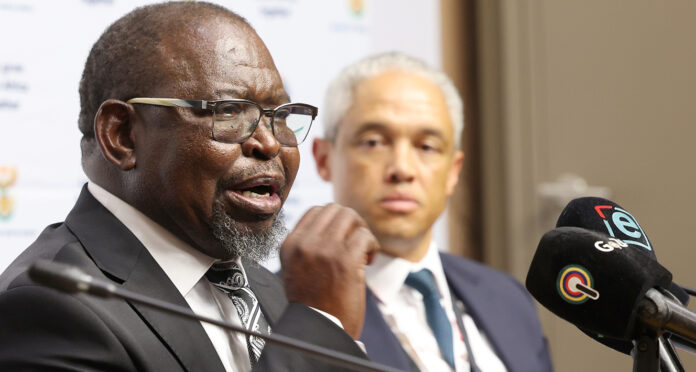Finance Minister Enoch Godongwana is expected to present a revised 2025/2026 national budget on May 21, marking an unprecedented third attempt to finalise South Africa’s fiscal framework after a court order invalidated parliament’s adoption of the initial plan and a public outcry forced a reversal of the proposed value-added tax (VAT) hike.
A senior government insider familiar with the proceedings confirmed the announcement, which comes after weeks of political and legal turmoil that revealed serious flaws in the government of national unity’s economic plan.
The Treasury is due to hold a media briefing by midday on Wednesday.
The fiscal crisis erupted in February when Godongwana had to abandon tabling the budget speech due to a fierce backlash to concerns over a two-percentage-point VAT hike.
In March, the minister tabled a budget proposing a 0.5% VAT increase split into two financial years, 2025/26 and 2026/27, to fund austerity measures.
The move sparked immediate backlash, with civil society groups and opposition parties slamming it as a betrayal of low-income households already battling food inflation.
High court ruling
On Sunday, the Western Cape High Court set aside parliament’s adoption of the fiscal framework.
The revised budget is expected to scrap the VAT increase entirely but possibly reallocate funds for social spending and infrastructure projects.
However, the Treasury cautioned that closing a R75-billion revenue shortfall while avoiding deeper debt spirals would be a nearly impossible task for the country.
This weekend, Sunday World reported that the Treasury was pressured to determine if re-tabling the national budget could potentially avert a recently scrapped VAT hike.
Even though the Treasury made a sudden U-turn on Thursday, declaring that the 0.5% VAT increase that was initially planned for May 1 had been cancelled, the increase was still enforceable until the court order on Sunday.
Unbudgeted items
Godongwana is expected to submit options to parliament on which parts of the budget could be sacrificed to avoid the R75-billion shortfall.
The social relief of distress grant, which was intended to be temporary since Covid-19, is one of the unbudgeted items. The ANC was afraid of potential public backlash and had to withdraw it.
The item accounted for about R102-billion over three years.
The public sector wage agreement, which costs about R35-billion over three years, was also not in the budget last October. Fee-free higher education was also not in the budget.



